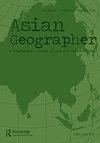Private sector climate change adaptation of accommodation suppliers in the small island of Koh Tao, Thailand
IF 2.2
Q2 GEOGRAPHY
引用次数: 3
Abstract
ABSTRACT Small islands are often portrait as being among the most vulnerable tourism destinations to climate change, particularly to impacts from sea level rise. This raises the question of how, if at all, locally bound tourism stakeholders, such as accommodation suppliers, consider climate change risks and if they already invest in adaptation measures. The nature of the concepts of adaptation and adaptation finance, with a lack of universally accepted metrics for its monitoring, allow a theoretical inquiry if mobilized finance can be labeled being climate finance. Against this background, this study investigates to what extent accommodation owner-managers do recognize climate change in their strategic investment decisions. A survey with 112 respondents and in-depth interviews with 16 interviewees were conducted on Koh Tao, Thailand. The findings reveal that most businesses (private sector) already invest in adaptation, whereas it appears to be a rather reactive (unconscious) form of adaptation. This shows that the private sector has an interest in addressing business risks, including climate change. The accommodation suppliers themself, however, likely do not bother how actions that reduce their business risks in regard to natural hazards are being labeled. The findings also show that adaptation behavior of accommodation suppliers appears to be influenced by power dynamics on Koh Tao. There is a concentration of power among a few families. This can hinder a sustainable and climate risk-informed development pathway and investment decisions of individual accommodation businesses.泰国小岛屿高岛住宿供应商的私营部门气候变化适应
小岛屿通常被认为是最容易受到气候变化,特别是海平面上升影响的旅游目的地之一。这就提出了一个问题,即住宿供应商等当地旅游利益相关者如何考虑气候变化风险,以及他们是否已经投资于适应措施。适应和适应融资概念的本质,以及缺乏普遍接受的监测指标,使得人们可以从理论上探究动员资金是否可以被贴上气候融资的标签。在此背景下,本研究调查了住宿业主管理者在其战略投资决策中认识到气候变化的程度。在泰国的涛岛,对112名受访者进行了调查,并对16名受访者进行了深度访谈。研究结果表明,大多数企业(私营部门)已经在适应方面进行了投资,而这似乎是一种相当被动的(无意识的)适应形式。这表明私营部门有兴趣解决包括气候变化在内的商业风险。然而,住宿供应商本身可能并不关心如何为减少自然灾害方面的业务风险的行动贴上标签。研究结果还表明,住宿供应商的适应行为似乎受到Koh Tao上权力动态的影响。权力集中在少数几个家族手中。这可能会阻碍可持续和气候风险知情的发展路径和个人住宿企业的投资决策。
本文章由计算机程序翻译,如有差异,请以英文原文为准。
求助全文
约1分钟内获得全文
求助全文
来源期刊

Asian Geographer
GEOGRAPHY-
CiteScore
3.30
自引率
0.00%
发文量
7
期刊介绍:
Asian Geographer disseminates knowledge about geographical problems and issues focusing on Asia and the Pacific Rim. Papers dealing with other regions should have a linkage to Asia and the Pacific Rim. Original and timely articles dealing with any field of physical or human geographical inquiries and methodologies will be considered for publication. We welcome, for example, submissions on people-environment interactions, urban and regional development, transport and large infrastructure, migration, natural disasters and their management, environment and energy issues. While the focus of the journal is placed on original research articles, review papers as well as viewpoints and research notes under the category of “Asian Geography in Brief” are also considered. Review papers should critically and constructively analyse the current state of understanding on geographical and planning topics in Asia. The ‘Asian Geography in Brief’ section welcomes submissions of applied geographical and planning research about Asia. The section aims to showcase (1) the diverse geography and planning of Asia; and (2) the diverse geographical and planning research about Asia. The journal will also publish special issues on particular themes or areas. Book reviews can be included from time to time.
 求助内容:
求助内容: 应助结果提醒方式:
应助结果提醒方式:


